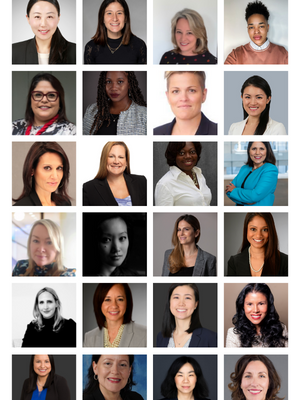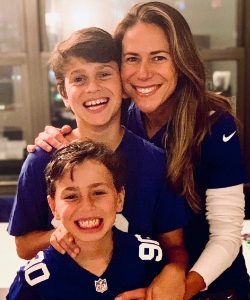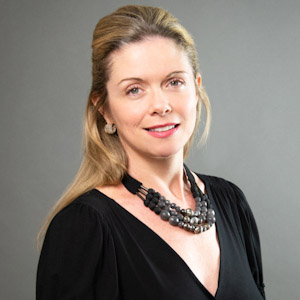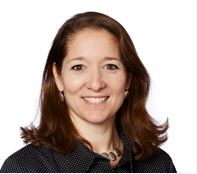 For over 15 years so far, we’ve had the opportunity to interview a diverse range of women leaders who are overcoming barriers, charting new territories and elevating their impact. Each woman is generous enough to sit with us and share her story to empower and inspire other women. At The Glass Hammer, we feel visibility matters – and it’s our honor to amplify the voices of women who are raising the ceiling on possibilities in their own lives and our world. Again and again, we hear about the importance of role models in enhancing our vision of what is possible.
For over 15 years so far, we’ve had the opportunity to interview a diverse range of women leaders who are overcoming barriers, charting new territories and elevating their impact. Each woman is generous enough to sit with us and share her story to empower and inspire other women. At The Glass Hammer, we feel visibility matters – and it’s our honor to amplify the voices of women who are raising the ceiling on possibilities in their own lives and our world. Again and again, we hear about the importance of role models in enhancing our vision of what is possible.
Looking across our leader profiles during 2022, we share a few words of wisdom and inspiration from each woman we’ve talked to so far this year. Thank you for the gift of your energy, time and insight!
“One of the key attributes of a great leader is authenticity, therefore I refuse to have separate work and home life personalities. I believe it is time to change the message that women, or indeed anyone, needs to adjust their personalities to fit with the corporate world.” – Charlene Kennedy: CEO, PGIM Private Capital (Ireland)
“What you will often hear is leaders defending their intent: ‘So are you saying that we discriminate? Are you saying that we aren’t fair?’ But the opportunity is if we can recognize that despite our best intentions, our decisions sometimes have impacts that we don’t intend. It’s important to be curious about the cumulative impacts of individual decisions, along with organizational systems and policies.” – Betsy Bagley: Co-Founder and Director, Pulsely
“I used to hate feedback, but I think feedback and constructive criticism is so important. You may have really good intentions and just not know you’re doing something that isn’t working for you. The feedback may be really hard to hear and digest, but sometimes it comes from a great place. Even if you may not agree, it’s good to hear it.” – Jessica Titlebaum Darmoni: Senior Manager, Head of Marketing, ErisX
“I’ve become more conscious of my own energy as I’ve become older, and that it’s always flowing in me, but you can also learn to use it and channel it. If I’ve got to get a team going, I really think about bringing that energy to the table… The biggest thing you can do to be successful is to be yourself and not listen to the detractors. Just let your light shine.” – Rachael Sansom: Managing Director, Red Havas UK
“You’ve got to remain true to yourself, because there are enough people telling you what you can’t do. I will always tell you what you can do. We’re going to make change together, but you have to be true to yourself. You have to be authentic. If you’re not, what’s the point?” – Brandi Boatner: Manager, Digital & Advocacy Communications, IBM
“Actively asking how others are feeling not only makes them feel more part of the team, but also establishes a level of trust and morale that makes everyone perform better. Being aware of how everyone else is feeling helps form a cohesive team because at the end of the day, we’re all working towards the same goal. If one person is having an off day, that’s going to impact the whole team. Knowing how to rally around and motivate that person not only helps the individual but brings the whole team closer together.” – Mariah Turner: Associate, PGIM Private Capital
“As you arrive to a real senior level, you will start to understand that people are going to have a hard time disagreeing with you. They tend to give you filtered information. If you know that, you can be much more deliberate and intentional in terms of how you ask questions, to make sure that you’re getting the real story and understanding different perspectives.” – Geline Midouin: Chief People Officer, Shearman & Sterling LLP
“It’s important to be able to trust and communicate to your leaders: here’s what I need from you and what I need you to help me with. That has made the difference for me in my career. And that is not wisdom that one must wait until they are well into their careers to acquire anymore. Remember, what I said at the outset of this interview, the world is different now, and leadership looks different.” – Pamela Peace: Principal & North America Client Management, PGIM Fixed Income
“First, you need to be able to identify it: I’m having a feeling. Then you need to name the feeling and ask yourself: What is driving that feeling and is it worthy of speaking up for? Then you ultimately need the self-confidence to speak up, be potentially willing to engage in a disagreement, and simply not question it too much. The more you question it, the more likely you are to miss the appropriate moment to say something, or to lose the feeling entirely. As you move through life, your gut instinct is one thing that stays with you, no matter what you choose.” – Erica Klinkowize: CBNA Treasurer, Citi
“In times of uncertainty, the focus has shifted from seeking answers to raising questions and building relationships to lead through the unknown… The circumstances of the last two years have made me a different leader. I had to take a step back and ask: what did I do in this time? And take the necessary steps to hopefully be proud of the answer.” – Danielle Arnone: Chief Digital & Technology Officer, Combe
“Figure out who can help. You cannot be a master of everything, nor should you be. Get a distributed style of management to get further, faster. Ask yourself who do I know and what do I need to learn?” – Bessie Kokalis Pescio: Vice President, Global Internal Communications, Philip Morris International
“I spent ten years in nursing. But there’s an expression in this part of the country that people are ‘called to preach.’ They have a burden to preach, meaning they can’t not do it. Well, in my case, I felt called to medicine. I had a burden to be a doctor and it would not go away… we never know how much time we’ve got on this planet, so I really don’t want to go to my grave without having tried to do what I felt I was called to.” – Dr. Sarah Carrier, MD: Emergency Physician, JH Quillen VA Medical Center
“Don’t just assume that people know what you want. You need to make sure that your managers and your stakeholders know that you are interested in other opportunities. Don’t be scared to let them know. It’s not like you’re going to be fired because you’re driven and want to move and grow.” – Jessica Jones: Managing Director, Head of Asia, PGIM Investments
“Earlier in my career, I thought I had to be the one with the voice. Now, I realize what I have to do is give or encourage or support the voices that have the information required, not always be the voice. That’s the muscle you develop with maturity and by realizing the amazing contributions that many voices bring to a conversation. That’s the muscle you develop when you embrace the diversity of thinking in a team to drive forward.“ – Renee Connolly: Chief Diversity, Equity & Inclusion Officer, Merck KGaA, Darmstadt, Germany
The transition over your career is toward managing up, and ensuring that you get what you need… I really have come to see the importance of don’t take on too much and do fewer things better, both of which I pass on to women just starting their career.” – Kate Kenner Archibald: Chief Marketing Officer, Dash Hudson
“I found a different lease on my otherness. I can’t chase everybody’s projection of me, but the more I recognize the uniqueness of my own experience, the more I feel I have to offer… One of the things now running through my veins is the knowing that what makes me connect with people is the ways in which we are similar, what intrigues and draws me to people is the ways in which we are different.” – Elena Kim: VP Business Development, TV/OTT at Global Music Rights
“The truth is, if I can be loving and patient, and approach whatever comes my way with compassion, everything will fall into place. Being a good lawyer, a good colleague, a good mother, a good partner, a good daughter – it all starts with being a loving person. Approaching things with a loving attitude will make things easier for you.” – Jingjing Liang: Associate, Compensation, Governance & ERISA practice, Shearman & Sterling LLP
“Early in my career, I was more conservative in offering my perspective and spoke only if I had the perfect comment. I’ve realized it’s okay to not always have the right answer or right idea, but it’s important to use your voice. There is power, value and hopefully impact, in sharing diverse perspectives… It doesn’t matter if you’re a junior level person in a room of more seasoned executives, you’ve been given a seat at the table for a reason and it is in the firm’s best interest to encourage and embrace your perspective. You have valuable things to say, so don’t sit in the background. Use your voice, early on.” – Ivy Tsui: Director of Program Management for DE&I, PGIM Real Estate
“I understand the stereotypes or expectations when a woman is in the room — how we’re expected to speak, defend our work, or refrain from speaking in an authoritative way — and I’ve told myself, ‘None of that applies to you, because you weren’t born and raised in this culture, so you’re going to embrace the otherness.’ So, I speak up, respectfully and never rude, but I have to speak.” – Louise Carroll: Partner, Real Estate, Katten
“I like to take complex problems and divide them into simpler ones, and I like to do that very fast. Every single problem, no matter how big, can be dissected, once you understand the root cause. But when you think you know the cause, you have to dig deeper and deeper. Once you have the root cause, everything else gets easier. You can find the paths to resolve the problem.” – Valeria Vitola: Managing Director, Anti-Money Laundering Region Head – Latin America (Except Mexico), Citibank
“When you’re building teams, you always want to be strongly committed to the diversity of your team’s experience and ideas. You don’t want to have uniformity in thought or expertise, as it could challenge disruption and innovation.” – Mary Cassai: Senior Vice President, Perioperative Services, NewYork-Presbyterian Hospital
“Create the greatest, grandest vision possible for your life and career because you become what you believe… Each step of my career taught me meaningful characteristics about myself and helped me make my next leap.” – Rupal Shah: Principal, PGIM Fixed Income
“We need to trust our gut. We know exactly where we see ourselves, but sometimes we’re afraid to share that vision. We just need to move confidently in the pursuit of our dreams. From every setback, we can learn… I’ve become more of an unapologetic Latina who stays optimistic about our future possibilities, but it took me 22 years of going through this journey to realize that it’s my life, it’s my vision, it’s my calling.” – Claudia Vazquez: Founder, elevink
“I love to take the time to get to know individuals: to listen and to avoid assumptions. I think that creates a space where people can be authentic, which leads to new conversations and new opportunities.” – Vanessa Nazario: Corporate Director, Chief Diversity Officer, Memorial Healthcare System
“I draw so much power from all the things that make me different. I used to view it as a disadvantage, but it’s so essential to how I’m able to show up, how effective and efficient I am, and the impact that I’m able to make. I draw from everything, and to have not done that for so many years was a detriment to my performance.…For this moment, while employers are asking you to bring yourself to work, do it. Do it now. Do it today. The hope is that this is a movement, not a moment. But time is of the essence, so do it. It will pay dividends.”- Amber Hairston: Agency Underwriter, PGIM Real Estate
“If you don’t know me and you don’t understand what drives me and what ails me, then how could you truly be in charge of growing me and taking me to the next level? I think it’s really important as managers that we take the approach of being coaches and changing the relationship from ‘I’m here to manage and make sure you do what you’re supposed to do’ to ‘I’m here to coach you and make sure that you exceed that.’… Most managers feel like I can’t get too close because then I can’t be objective, and I think it’s the opposite. If you’re not close enough, you’re going to miss what’s happening and you’re going to miss opportunities to support people in a way that makes them want to come to work and be part of the community.” – Indhira Arrington: Global Chief Diversity, Equity and Inclusion Officer, Ares Management
“That (Latina) part of my identity and proving myself is impacted by this other part of me that needs to grow and trust other people to do things, even though I don’t have 100% control. Letting go of some of that control has been hard, but I’m working on it. I’ve realized that everyone is an individual, and they’re not all like me, and I have to manage to each person versus to what my personal expectations, approaches, or processes would be.” – Cassandra Cuellar: Partner, Venture Capital, M&A and Capital Markets, Shearman & Sterling LLP
“I enjoyed going into rooms and finding those moments where I’d pipe up with an interesting point of view or a question, and all of a sudden, people would shift around and look at me. So I find it quite empowering. I’ve used the difference to my advantage… I think all of these factors combined meant I didn’t buy into the barrier, and just ignored it, and still today it hasn’t stopped me, because I have a deeper belief that it can happen – at least in the spaces where I’m operating in.” – Sabina Munnelly: Partner, Baringa
“Opportunity only lands on people who seek it. If you want to be sponsored, you need to give people an opportunity to get to know you: what you want to do, what your strengths are, and what challenges you might be facing.” – Ashley Shan: Associate, Finance Group, Shearman & Sterling LLP
“In my experience, a lot of the influence and ability to make changes come from working at the intersection of different disciplines and taking that experience to management and leadership… In technology or in any industry, being able to have that broader aperture allows someone to see more opportunities and navigate better decisions about where they want to go and how to do it to make a broader impact in an organization.” – Joyce Shen: AI investor, board director, author, and data science at UC Berkeley
“You should feel comfortable and confident that you can speak up. You might not say everything perfectly or you might even say something wrong, but that’s okay. Plenty of people will talk and know less than you do… I bring my own unique perspective to the table. Adding my voice may steer the conversation or decision-making in a certain way, or add more nuance to the overall discussion.” – Fiona Cho: COO of Asia-Pacific Region, PGIM Real Estate
Interviewed by Aimee Hansen






 When you consider your career, it’s vital to get clear on what brings you joy, says Sarah Wolman.
When you consider your career, it’s vital to get clear on what brings you joy, says Sarah Wolman.


